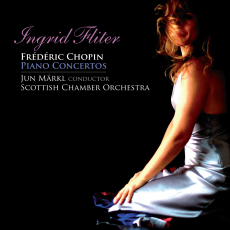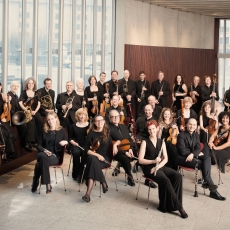Ingrid Fliter - Scottish Chamber Orchestra - Chopin: Piano Concertos - MusicWeb International
The Scottish Chamber
Orchestra' most recent recording for Linn finds them joining forces with two
artists with whom they are not automatically linked. The results are fresh and
exciting and propel this disc of the Chopin concertos towards the very top.
The first thing
that strikes you is the excellent clarity of the orchestral sound. The bloom on
the Usher Hall acoustic is just right, giving a lovely sense of presence to the
overall sound, and the soundscape created for the orchestra gives great precision
to the instruments. The trombone, for example, is beautifully captured in the
opening tutti of the First Concerto - present and
important but never dominating - and when the second subject enters the blend
between the strings and winds is just right. The Linn engineers have
consistently shown themselves to be among the very best in the business for
this sort of thing, but this recording impressed me most particularly. When the
SCO played the second concerto as part of their 40th birthday concert, some commented that the subordinate role of the
orchestra made it a poor choice for such an occasion, but these recordings show
how much can be made of Chopin's orchestral texture when it is in the right
hands. In fact, this music is ideally suited to being played by a chamber
orchestra, especially one with the SCO's historically informed experience, as anyone
listening to the translucent, unburdened string sound at the opening of No. 1's
slow movement will be able to tell you.
When she enters in
the first concerto, Fliter strides onto the scene with assertive power but no
sense of being overbearing, and throughout the disc, while there is little
doubt that it is the piano that the composer was most interested in, the
overall sense is of a reciprocal conversation between two equals. Her treatment
of the second subject is delicate and nuanced and in the development she darts
delicately over the keyboard, as if she is trying not to dominate and to draw
out the more subtle nuances of this music. Fliter's playing style is perfect
for Chopin, combining muscular, precise technique with a rhapsodic sense of
letting the melody flow. Listen to the way she unfurls the piano line in both
the slow movements, delicately, gently letting the music breathe so that the
bar lines seem to dissolve and the gorgeous harmonies take flight. The
Larghetto of No. 2, in
particular, is to die for, Fliter seemingly creating it spontaneously beneath
her fingertips while the orchestra gently look on, as if in benediction.
For all the proviso
that these are not especially orchestral concertos, Jun Märkl shapes them very
well. The modulation into the major key at the onset of the development section
of No. 1's
first movement, for example, is beautifully handled, as is the rhythm of the
finales, both of which move with a careful combination of energy and tact. More
generally, Märkl manages the transition so that these concertos, which can
sound episodic in some hands, flow naturally from one component to another.
Importantly, he allows the individual orchestral instruments their moment in
the sun when the score gives it to them - the extremely characterful winds, for
example, and most especially a knockout bassoon - and the second concerto is
particularly well served by the orchestra's sense of interplay with the piano.
I'm very fond of Rubinstein's RCA disc of the concertos, albeit from a
completely different sound world, and Zimerman's recording with the Polish
Festival Orchestra has an atmosphere and flair that is impossible to replicate.
Fliter's disc is a winner all-round, however, and its freshness, clarity and
beauty means that it's the one I'll be coming back to most readily when next I
want to hear these works.



